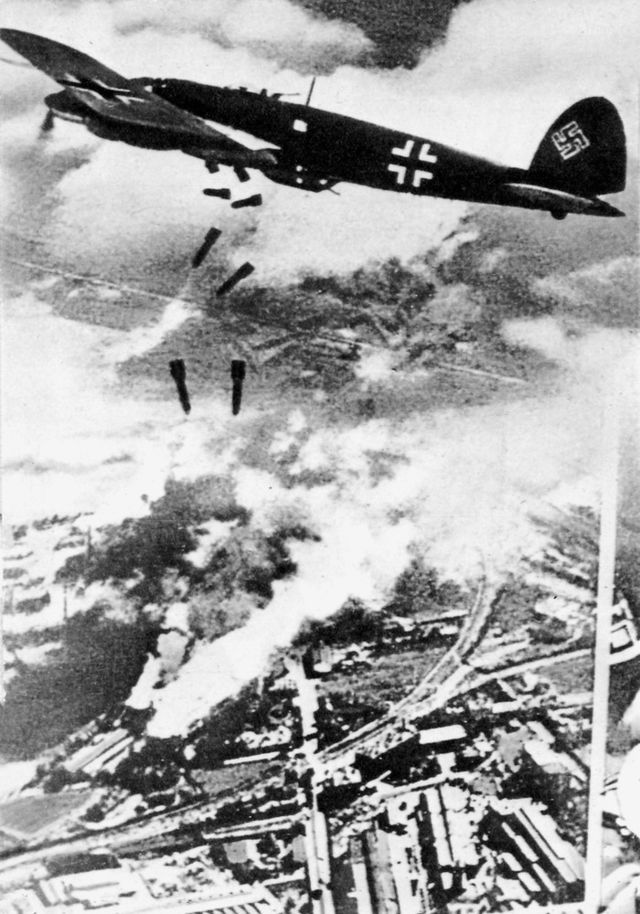Sunday 24 September 1939
 |
| The Luftwaffe Bombing Warsaw. |
By now, the Polish Air Force is largely just a memory. There are few shelters for civilians. The bombing attack ruptures water pipes and fire-fighting attempts are minimal. This is the first instance of "terror bombing" and will become a part of a familiar litany of names used by Allied propaganda: "Warsaw, Rotterdam...." The British in particular are put out by the raid, considering it an unwarranted escalation of violence contrary to German assurances of just a few weeks before. Adolf Hitler, surveying the damage, later remarks, "That is how I can deal with any European city."
General der Flieger Albert Kesselring, in command of Luftflotte 1, arranges the bombing raid in support of Army Group North under the command of Generaloberst Fedor von Bock. Having only fairly recently earned his flying wings, Kesselring takes to observing the bombing of the city in his light plane. Either on this or one of the immediately following days, he is shot down. It is the first of five times that Kesselring is shot down during the war.
The bombing raids are to aid the advancing Heer, which commences its assault on Warsaw. This will be a recurring pattern, with massive Luftwaffe raids on large cities immediately prior to ground assault. A later example of this is Stalingrad, where a raid on 24 August 1942 heralded the siege of the city.
Elsewhere, the Soviets capture Grodno. Also, the Soviet 8th Rifle Corps intercepts the 14th Regiment of Jazlowiec Uhlans commanded by Major Witold Radziulewicz. The Poles are fleeing southwards towards the border. At the Battle of Husynne, some 400 Polish mounted policemen from Warsaw, aided by artillery, beat back Soviet infantry. Radziulewicz attempts to break through the Soviet line to continue heading south, but Soviet tanks move in and force the Poles to surrender. The Soviets suffer hundreds of casualties while the Poles lose only 18 killed and 139 wounded. It is another indication - for those looking - of the weakness of Soviet tactics and perhaps some lack of a sense of urgency in the Soviet ranks.
The Germans officially announce that they have crossed the Vistula between Modlin and Warsaw, cutting off the capital.
Soviet Military: Soviet troops take oil wells at Drohobycz, the heart of the Galician oilfields.
Western Front, Ground Operations: The Germans make some local attacks that are repulsed. The British Expeditionary Force (BEF) is moving into position.
Western Front Air Operations: Reconnaissance flights take place over Western Germany. During the course of the night, propaganda leaflets are dropped.
 |
| Pictured is SS Porta, the sister ship of SS Minden. The Minden was scuttled by its own crew on 24 September 1939. |
Swedish Steamer Gertrude Blatt and British cargo steamer Hazelside are sunk. There are some 11 casualties from the latter.
The Germans commission Z22 Anton Schmitt, a 1936 Zerstörer (destroyer).
Future History: Oberscharführer (sergeant) Rochus Misch is one of four men selected by his company commander, SS-Hauptsturmführer Wilhelm Mohnke, to negotiate the surrender of the Fortress of Modlin. He can speak a little Polish. The negotiations fail, and whilst on the way back to German lines, Misch is shot several times. He spends six weeks in a convalescent home after surgery. Mohnke recommends him for the Führerbegleitkommando (Führer Escort Command; FBK), a cushy position in Berlin.
Misch winds up traveling with Hitler as his bodyguard throughout the war. He even becomes the radio guy in the Berlin bunker in April 1945. Misch stays to the end and is the primary source for the account of Hitler's fate. In a strange twist of fate, he and Mohnke meet up again that month when Mohnke becomes the last commander of Berlin. Mohnke, accused of multiple war crimes, is never prosecuted and passes away in 2001.
Misch remains an obscure figure for decades. Eventually, however, he outlives everybody else who was in the bunker and becomes a minor celebrity. He gives adamant re-tellings of how Hitler died on 30 April 1945 despite recurrent skepticism in some quarters. He also appears to relish his association with Hitler until his passing. Misch finally passes away on 5 September 2013.
 |
| Rochus Misch, a first-hand witness to events in the Hitler bunker, is shot on 24 September 1939 but survives. |
 |
| The approximate position of the SS Minden, sunk off the southeast coast of Iceland, located in 2017. |
September 1939
September 1, 1939: Invasion of PolandSeptember 2, 1939: Danzig Annexed
September 3, 1939: France, Great Britain Declare War
September 4, 1939: First RAF Raid
September 5, 1939: The US Stays Out
September 6, 1939: Battle of Barking Creek
September 7, 1939: Polish HQ Bugs Out
September 8, 1939: War Crimes in Poland
September 9, 1939: The Empire Strikes Back
September 10, 1939: The Germans Break Out
September 11, 1939: Battle of Kałuszyn
September 12, 1939: The French Chicken Out
September 13, 1939: The Battle of Modlin
September 14, 1939: Germany Captures Gdynia
September 15, 1939: Warsaw Surrounded
September 16, 1939: Battle of Jaworów
September 17, 1939: Soviets Invade Poland
September 18, 1939: Lublin Falls
September 19, 1939: Germans, Soviets Hook Up
September 20, 1939: the Kraków Army Surrenders
September 21, 1939: Romania Convulses
September 22, 1939: Joint Soviet-German Military Parade
September 23, 1939: The Panama Conference
September 24, 1939: The Luftwaffe Bombs Warsaw
September 25, 1939: Black Monday for Warsaw
September 26, 1939: Warsaw on the Ropes
September 27, 1939: Hitler Decides to Invade France
September 28, 1939: Warsaw Capitulates
September 29, 1939: Modlin Fortress Falls
September 30, 1939: Graf Spee on the Loose
2019
No comments:
Post a Comment